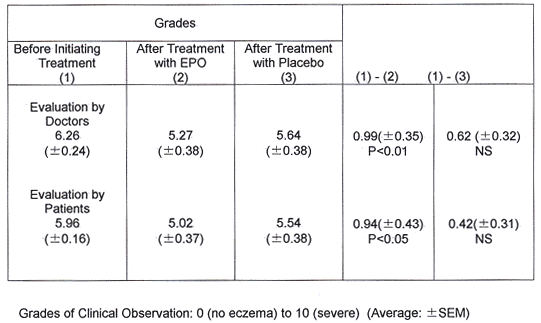|
Treatment of Atopic Eczema with Evening Primrose Oil
|
In 1993, reduced levels of unsaturated fatty acids in the blood of children with eczematous symptoms were reported. Since then, several researchers reported therapeutic results when corn oil and fresh lard were added to food of patients with atopic eczema. However, these studies were not properly controlled. In a properly controlled trial in 1955, it was shown that daily oral administration of a small amount of linoleic acid was not useful in eczema. With the use of locally acting steroid drugs, dietary therapies for eczema in which fat was administered orally became obsolete. Since then, the potential roles of unsaturated fats in the etiology of eczema have had little opportunity to be adequatley studied.

Evening primrose oil (EPO) is rich in linoleic acid and γ-linoleic acid. These components produced clinical improvement in treatment of atopic eczema. In a placebo-controlled, randomized, double-blind crossover trial, in which the subjects were 17 children aged between 18 months and 13 years old, and 15 adults aged from 14 to 32 years old, all of whom had suffered from atopic eczema for at least half a year, each subject took EPO capsules (500mg) containing 45mgγ-linoleic acid. Placebo capsules contained liquid paraffin. For the adults, either 4 EPO capsules or 4 placebo capsules per administration were administered twice daily over 3 weeks. The capsules prescribed were then crossed over, and given continuously in the same manner for a further 3 weeks. Child subjects received half the amount administered to adults. All the patients, who had previously used mild topical steroids, took their drugs continuously during the treatment. In medical examinations carried out every three weeks, the patients, or guardians in the case of the children, were instructed to record the levels of severity of their eczema, ranging from zero (no eczema) to 10cm (severe) in graphical form. Doctors also performed a similar evaluation.

EPO produced no side effects among the adults or children. The patients who took EPO orally showed significant improvement in subjective and objective findings observed by the patients and the doctors. (See the table below)

This preliminary observation suggested that anomalies in fatty acid metabolism might be involved in manifestations of atopic eczema. Research into some promising mechanisms should be carried out in the future. For example, γ- linoleic acid is a precursor of prostaglandin E1 (PGE1), which is necessary for activity of normal T-lymphocyes. Low activity of T-lymphocytes among the patients with atopic eczema could be caused by inhibition of the metabolism producing PGE1.
from THE LANCET,JANUARY31,1981(C.R.Love11,J.B.Burton,D.F.Horrobin)
Grades of Improvements in Treating Clinically Severe Eczema with Evening Primrose Oil and Its Comparison with Placebo

|
|
・
|